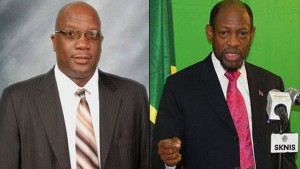 The Eastern Caribbean Court of Appel has ruled that St Kitts and Nevis’ Prime Minister Dr the Hon Timothy Harris must comply with a High Court Order and hand over a number of documents from his coalition administration’s Cabinet meetings to Leader of Her Majesty’s Loyal Opposition the Rt Hon Dr Denzil Douglas.
The Eastern Caribbean Court of Appel has ruled that St Kitts and Nevis’ Prime Minister Dr the Hon Timothy Harris must comply with a High Court Order and hand over a number of documents from his coalition administration’s Cabinet meetings to Leader of Her Majesty’s Loyal Opposition the Rt Hon Dr Denzil Douglas.
The judgment written by Appeal Court Justice Davidson Baptiste and concurred by two other judges – Louise Blenman and Paul Webster dismissed Dr Harris’ appeal and ordered him to costs of the appeal Dr Douglas, the respondent.
In the ruling the justices noted that While recognising that the claim was brought against Dr. Harris in his personal capacity, that Justice Eddy Ventose concluded that the statements related to him as Prime Minister and Head of Cabinet and the various ministerial portfolios held by him.
The Appeal Court reasoned Justice Ventose that it was unrealistic to suggest that as Prime Minister, Dr. Harris is not entitled to the documents, pointing out that ministers report to him for matters falling under their ministerial portfolios.
“Accordingly, the judge’s analysis and finding with respect to CPR 28.2, that the appellant must disclose the documents which he has or has had a right to inspect or take copies of or has had a right to possession of them, cannot be faulted, having been properly reasoned.”
“In this interlocutory appeal, Dr. Timothy Harris, the Prime Minister of the Federation of Saint Christopher and Nevis, challenges an order of specific disclosure of documents granted to Dr. Denzil Douglas, Leader of the Opposition and former Prime Minister. The order has its genesis in a libel claim Dr. Harris instituted against Dr. Douglas emanating from statements made by the latter on a local radio station on 22nd June 2016 in which he imputed the acceptance of bribes and other criminal conduct on the part of Dr. Harris. The statement also related to the operation and management of a stem cell research and medicine facility and regenerative project at the local hospital, the St. Kitts Institute for Regenerative Medicine Limited (‘the Institute”), for which Royal St. Kitts Medical Centre was granted a business licence by the government. The disclosed documents were in relation to the Institute,” said the judgment.
The Appeal judges noted “three grounds of appeal were advanced: The judge erred in law in holding that: (i) the documents were in the possession and control of Dr. Harris within the meaning of CPR 28.2;
(ii) the documents were not subject protected from disclosure by virtue of the duty of confidentiality set out in oath of secrecy taken by Dr. Harris pursuant to section 60 of the Constitution of Saint Christopher and Nevis(“the Constitution”); and (iii) the documents were directly relevant within the meaning of CPR 28.1
“The Appeal Court found that Justice Ventose considered the application before him, the pleadings and submissions of the parties. He was cognisant of and applied the correct legal principles relating to specific disclosure.
“He also recognised the importance of identifying the factual issues which would arise for decision at the trial and that specific disclosure must be limited to documents relevant to these issues. The learned judge’s finding that the documents requested were directly relevant is not one this Court should interfere with,” the Appeal Court ruled
“I am not of the view that the judge misdirected himself in law or otherwise erred in arriving at his decision. There is no basis for appellate interference with the learned judge’s discretionary evaluation. For all the reasons given, it is ordered that the appeal is dismissed. In circumstances where the respondent has successfully defended the appeal, the appellant shall pay costs of the appeal to the respondent in the sum of $1,000.00.
